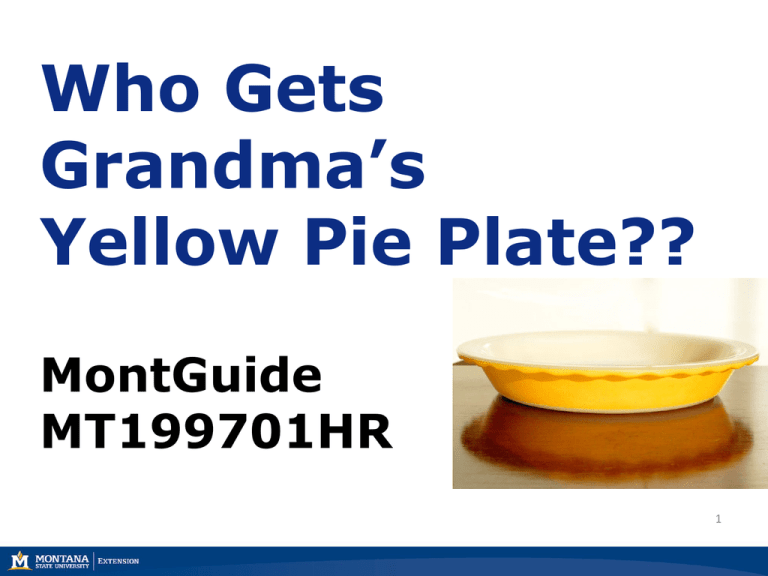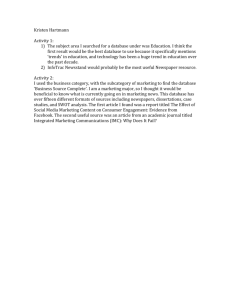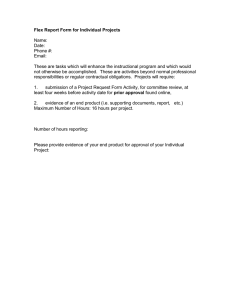Who Gets Grandma’s Yellow Pie Plate?? MontGuide
advertisement

Who Gets Grandma’s Yellow Pie Plate?? MontGuide MT199701HR 1 Who Gets Grandpa’s Watch? Transferring Nontitled property 2 Everybody has property • Titled • Non-titled 3 Titled Property •Owner identified on a written document 4 Titled Property includes: • Real Estate • Savings & Checking Accounts, CDs • Motor Vehicles • Machinery • Stocks & Bonds 5 At death, titled property passes by: • Written Will • Montana Intestate Succession Statutes • Contractual Arrangements 6 Contractual Arrangements Joint Tenancy (jtwros) • John Doe and Mary Doe as Joint Tenants with Right of Survivorship and not as Tenants in Common • Survivor Recieves 7 Contractual Arrangements Designated Beneficiaries Life insurance • Annuities • Retirement Plans • (IRAs, KEOGHs, SEPs) 8 Contractual Arrangements Payable on Death (POD) • Accounts at financial institutions • At death, ownership passes to POD beneficiaries 9 Contractual Arrangements Transfers on Death (TOD) Accounts • Stocks • Bonds • Mutual Funds 10 Summary Titled property passes •Written Will •Montana Law of Intestate Succession •Contractual Arrangements 11 Non-titled Property Ownership Owner is not identified with a written document 12 Non-titled property: • • • • • • Guns Tools Furniture Dishes Linens & needlework Collections 13 Personal Belongings • • • • • Wedding photographs Baseball glove Books Christmas decorations Jewelry 14 Facing Difficult Issues •Death •Loss of family members 15 Different Perceptions •What is fair •Depends on what they feel “entitled” to •Who or what they have done for parents 16 Lack of Communication • Individuals are not asked What is important to them What they think or feel 17 Assumptions are made • Intentions • Goals • Perceptions that may be inaccurate 18 Decision making delayed Until crisis occurs • Immediate action required • Death Move into nursing home 19 Transfer of non-titled property can create challenges among family Why?? 20 Different Meanings •Personal belongings have different meanings for each individual 21 Emotional Value •Sentimental value or meaning attached to item may be more important than the financial or dollar value 22 What is fair? •Difficult to divide items with sentimental value in a way considered fair to all parties 23 Different Perceptions •People have different perceptions of what is a fair process & what are fair results 24 Difficult to Talk • Talking about one’s possessions may be more personal than talking about other types of financial assets 25 Process of Saying Goodbye •A type of grieving that may not be needed in transfer of titled property 26 Issue of Ownership • No proof of ownership exists 27 Who is family??? •Who has a right to make decisions? Biological In-laws 28 6 Factors to Consider Transferring Personal Property 29 Understand Sensitivity of Issue Factor 1 30 Sentimental Value • Memories • Emotions • Feelings 31 Facing Loss & Transitions • Grieving loss of family member • Selling the home in which they grew up • Facing increasing dependence of an elder 32 How to Begin • Ask what ifs: “Dad, what if you were no longer able to live here? What would you like to have us do with…..” 33 How to Begin • Natural opportunities • Move to smaller home 34 Determine What to Accomplish Factor 2 35 Sort Out Goals • Maintain privacy? • Improve family relationships? • Be fair to all involved? 36 Potential Goals (con’d) • Keep memories • Contribute to society • Preserve heritage & history 37 Determine what fair means in context of your family Factor 3 38 Perceptions…... Fair……..is not always equal 39 Equal Considers •Number of items •Dollar value •Emotional value 40 Equitable Considers •Distinctive circumstances of family members 41 Differences Into Account • Contributions over years • Needs (financial, emotional, physical) • Age, birth order, marital status, gender • Personal interest in item 42 Assumptions •What assumptions do members of your family have about what is fair when transferring nontitled personal property? 43 Identify the meaning of objects Factor 4 44 Meanings will Differ • Age • Marital status • Gender • Birth order 45 Special Objects •Serve as props for telling family stories 46 Owners of Non-titled Property Identify Special Objects •Describe item •Why item is special •Who should receive it •Why 47 For Children or Other Potential Receivers of Non-titled Property •Describe special objects •Item is special to me because…. •If someone else received this item I would feel….. 48 Recognize Distribution Options & Consequences Factor 5 49 Montana Uniform Probate Code Written Will Paragraph 50 To: My Family, Devisees, or PR This is my separate listing of tangible personal property that I referred to in my Last Will and Testament. Please distribute the items below to the persons I have named. 51 Separate listing Item my Grandma Ray’s Opal Ring my niece, Bethany Harper my Montana Sapphire Ring, my friend, Barbara Johnson Date Signature 52 Verbal or “someday promises” • Misunderstandings when more than one person feels he/she has been promised same item. 53 Caution: Verbal or “someday promises” • May cause problems when items break, are sold or lost, or are given to another person before “someday” arrives. 54 Masking Tape/Labeling •May fall off, be removed, or become illegible. 55 Masking Tape/Labeling •Is not legally binding •Must have will & valid list of tangible personal property 56 Private Auction •Potential Consequences •Wealthier bidders can outbid others 57 Public Auction • Potential Consequences • Items go to individuals outside family • Income to estate or property owner if living 58 Family Distribution Methods • Shake Dice • Draw Numbers • Preference based on Gender Birth order 59 Agree to manage conflicts if they arise Factor 6 60 Sources of Conflict 1. Lack of communication 61 Sources of Conflict 2.Unresolved • • Family tensions Personal Relationship issues 62 Tensions • Power & control among family members • Envy & jealousy • Greed & selfishness • Inability to compromise 63 Listen for Feelings •Respect & care about family members ideas & thoughts 64 Reflective listening • Listen for feelings • Reflect those feelings in your own words back to the person speaking 65 Minnesota Survey Participant “You never really know a person until you share an inheritance with them!” 66 Remember • No perfect method of transfer • Each method has consequences • More transfer options are available when transfers are planned prior to death 67 Who Gets Grandma’s Yellow Pie Plate?? MontGuide MT199701HR 68



